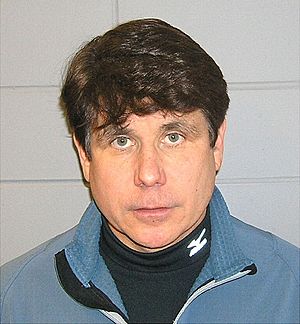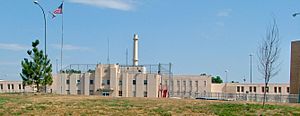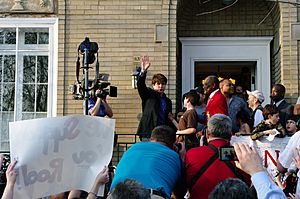Rod Blagojevich facts for kids
Quick facts for kids
Rod Blagojevich
|
|
|---|---|
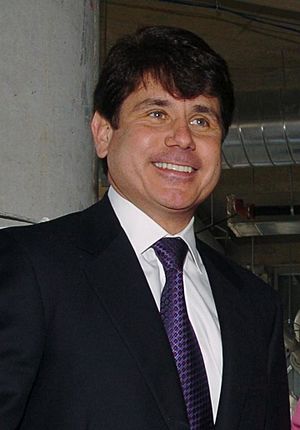
Blagojevich in 2007
|
|
| 40th Governor of Illinois | |
| In office January 13, 2003 – January 29, 2009 |
|
| Lieutenant | Pat Quinn |
| Preceded by | George Ryan |
| Succeeded by | Pat Quinn |
| Member of the U.S. House of Representatives from Illinois's 5th district |
|
| In office January 3, 1997 – January 3, 2003 |
|
| Preceded by | Michael Flanagan |
| Succeeded by | Rahm Emanuel |
| Member of the Illinois House of Representatives from the 33rd district |
|
| In office January 6, 1993 – January 3, 1997 |
|
| Preceded by | Myron Kulas |
| Succeeded by | John Fritchey |
| Personal details | |
| Born |
Rod Blagojevich
December 10, 1956 Chicago, Illinois, U.S. |
| Political party | Democratic |
| Spouse |
Patti Mell
(m. 1990) |
| Children | 2 |
| Education |
|
| Signature | |
| Criminal information |
|
| Criminal status |
|
| Conviction(s) | |
| Criminal penalty | Served nearly 8 years of a 14 year sentence; commuted 2020, Pardon 2025 |
Rod R. Blagojevich (born December 10, 1956), often called "Blago," is an American politician. He was the 40th governor of Illinois, serving from 2003 to 2009. As a member of the Democratic Party, he also served in the Illinois state government and the U.S. Congress.
Blagojevich's time as governor ended when he was removed from office. This happened after he was accused of serious wrongdoing. He was later found guilty in a federal trial and sentenced to 14 years in prison. After serving nearly eight years, President Donald Trump shortened his sentence in 2020. In 2025, Trump gave him a full pardon, which cleared his record.
To date, Blagojevich is the only governor in Illinois history to be impeached and removed from office.
Contents
Early Life and Education
Rod Blagojevich was born in Chicago, Illinois. His parents were immigrants from Serbia. His father, Rade, worked in a steel plant, and his mother was named Mila. Growing up, Rod helped his family by working many jobs, like shining shoes and delivering pizzas.
He went to Foreman High School in Chicago. He played basketball and also trained as a boxer. After high school, he attended the University of Tampa and later Northwestern University, where he earned a degree in history in 1979. He then went to Pepperdine University School of Law to become a lawyer.
Blagojevich is married to Patricia Mell, and they have two children.
Start in Politics
After law school, Blagojevich worked as a prosecutor for Cook County. He handled cases involving domestic abuse and weapons.
In 1992, he was elected to the Illinois House of Representatives. He represented a district on Chicago's North Side. He focused on writing laws to reduce crime.
A Move to National Politics
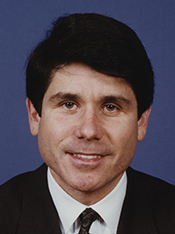
In 1996, Blagojevich ran for the U.S. House of Representatives. He won the election for Illinois's 5th congressional district and was reelected twice.
As a congressman, he traveled with Jesse Jackson to Yugoslavia. They went to negotiate the release of American soldiers who were being held as prisoners. In 2002, he voted to authorize the invasion of Iraq.
Governor of Illinois
In 2002, Blagojevich ran for governor of Illinois and won. He became the first Democrat to be elected governor of Illinois since 1972. His campaign focused on the theme of "ending business as usual" in state government.
During his time as governor, Blagojevich signed many new laws. He increased funding for schools and approved new projects to improve roads and buildings. He also signed laws to protect people from being treated unfairly based on their sexual orientation.
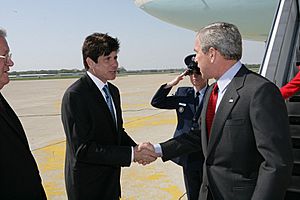
First and Second Term Highlights
Blagojevich supported a ban on the death penalty in Illinois. He also signed a law that made it illegal to smoke in most public places. One of his most famous programs was called All Kids. This program aimed to provide healthcare for every child in Illinois.
In 2006, he was reelected for a second term. He defeated Republican Judy Baar Topinka. During his campaign, he promised to find new ways to fund education.
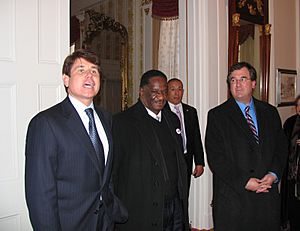
Disagreements in Government
Blagojevich often disagreed with other lawmakers, including members of his own Democratic party. He had public arguments with Lieutenant Governor Pat Quinn and Attorney General Lisa Madigan.
He also had a difficult relationship with the state legislature. He called many special sessions, which are extra meetings for lawmakers. Some lawmakers felt he did not work well with them, which made it hard to pass new laws.
Removal from Office
In December 2008, Blagojevich was arrested by the FBI. He was accused of trying to use his power as governor for personal benefit. The most serious charge was that he tried to sell the U.S. Senate seat that Barack Obama left open when he was elected president.
Because of these accusations, the Illinois government decided to take action. The process of formally accusing a public official of wrongdoing is called impeachment.
On January 8, 2009, the Illinois House voted to impeach Blagojevich. Later that month, the Illinois Senate voted to remove him from office. He was also banned from ever holding public office in Illinois again. His lieutenant governor, Pat Quinn, then became the new governor.
What Happened Next?
Even though he was removed from office, Blagojevich still had to face a federal trial. In 2011, he was found guilty on 17 charges, including trying to sell the Senate seat. He was sentenced to 14 years in federal prison.
Blagojevich began his prison sentence on March 15, 2012. He was the fourth Illinois governor to serve time in a federal prison. While in prison, he was the lead singer for a band called "The Jailhouse Rockers."
He appealed his case many times. In 2015, a court overturned five of his convictions but kept the others. A judge later decided that his 14-year sentence was still appropriate.
Life After Politics
After being removed from office, Blagojevich appeared on several TV shows. He was a contestant on The Celebrity Apprentice and started a radio show. He also wrote a book about his experiences called The Governor.
Blagojevich often said he was innocent. He and his wife, Patti, worked to bring attention to his case.
Commutation and Pardon
On February 18, 2020, President Donald Trump commuted Blagojevich's sentence. A commutation shortens a prison sentence but does not erase the conviction. Blagojevich was released from prison that day after serving almost eight years.
After his release, Blagojevich called himself a "Trump-ocrat" and thanked the president. Because of his conviction, the Supreme Court of Illinois took away his law license in May 2020.
On February 10, 2025, President Trump gave Blagojevich a full pardon. A pardon completely forgives a person for a crime and clears their record.
Electoral History
House of Representatives
- 1996: Rod Blagojevich (D) - 64%; Michael Flanagan (R) - 36%
- 1998: Rod Blagojevich (D) - 74%; Alan Spitz (R) - 24%
- 2000: Rod Blagojevich (D) - 87%; Matt Beauchamp (L) - 13%
Gubernatorial Elections
- 2002: Rod Blagojevich (D) - 52.0%; Jim Ryan (R) - 45.2%; Cal Skinner (L) - 2.1%
- 2006: Rod Blagojevich (D) - 49.8%; Judy Baar Topinka (R) - 39.3%; Rich Whitney (G) - 10.4%
Images for kids
See also
 In Spanish: Rod Blagojevich para niños
In Spanish: Rod Blagojevich para niños
 | John T. Biggers |
 | Thomas Blackshear |
 | Mark Bradford |
 | Beverly Buchanan |


